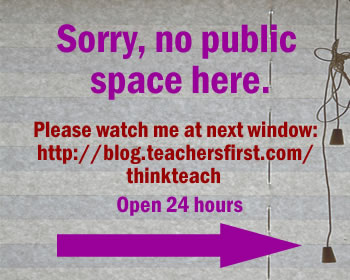Putting First Things First- Ask the Educators
How often do you, as an educator, have the chance to provide a vision for a new technology before it is even available? Or contribute ideas for anything coming “down the pike”?
How often do industry innovators put learning first in their vision for a new technology?
Here is your chance.
The parent company of TeachersFirst , The Source for Learning, has just teamed with the National Educational Broadband Services Association (NEBSA) to create a competition that puts first things first: educator before techie, learning before “glitz.” The whole idea is to ask the innovative minds out there who constantly think up new ways to engage, inspire, motivate, lure, cajole, launch, fascinate, steer, elevate, redirect, hatch, etc. how they envision a technology that isn’t even readily available yet. This is a dreamers chance to learn and a learners chance to dream.
We pulled this competition together very quickly and, unfortunately, the entries are due rather quickly. I hope people will spread the word quickly, since the actual entry is NOT that complicated (500 words– a middle teacher says that much just getting the notebooks out or computers fired up!). What really excites me, though, is the very idea of asking the educators instead of telling them. A sharp teacher might even ask the KIDS for their ideas to make up the entry!
So if you read this blog..tell a friend. Twit it, blog it, email it, listserv it …even post it in the teachers room. This is YOUR chance. Dream big.
———————————
The full text of the “announcement” I sent in email:
The Source for Learning Teams with NEBSA on Wireless Broadband Education Competition Two nonprofit organizations—both leaders in educational technology—have teamed to sponsor a contest that will explore exciting educational uses for the next revolutionary technology: wireless broadband. The Source for Learning, Inc. (www.sourceforlearning.org) and the National Educational Broadband Service Association (www.nebsa.org) have for years been instrumental in helping educators enhance teaching and learning through technology. The Wireless Broadband Education Competition will create a showcase for innovative educational uses of one of the newest dimensions of the learning experience: mobility. High-quality wireless connectivity is coming soon, and it will have a major impact on education—“anytime/anywhere” learning. But how will it actually be used? Exciting possibilities are starting to emerge—imagine, for instance:
- A class goes to a field behind the school to research native animals and habitats. While there, with no wires needed, they use the web to learn more about what they find, and share the experience via live video feed with other classrooms—from the same school or from many schools, anywhere in the world.
- A few students visit a location—for instance a “wind farm” where clean energy is generated. Other classrooms watch the visit live; they ask questions in real time as the students meet an expert and see the workings of the site. The students upload the GPS coordinates of the site; that data is merged with Google Earth layers showing wind patterns and electric power needs, for a comprehensive understanding of the experience.
- Older, non-wired school buildings add fast Internet access from any room, with no wires and virtually no capital expense.
- Students use digital equipment to measure on-site water quality in real time from multiple locations without leaving their classrooms.
To stimulate creative thinking about learning supported by this new technology, SFL and NEBSA announce a competition for U.S. educators (Pre-K – 16), asking them to use their imaginations about ways in which wireless broadband could support and enhance teaching and learning. Three Grand Prize winners will receive scholarships to present their proposals at the National EBS Association Annual Convention, which will be held in Boca Raton, Florida from February 23-25, 2009. Each of the winners’ schools will also receive a $200 reimbursement to cover related school substitute costs.
Visit the competition site for full details: http://wirelessbroadbandeducation.com/. Phase One submissions are due November 1, 2008, via a simple online entry form.









